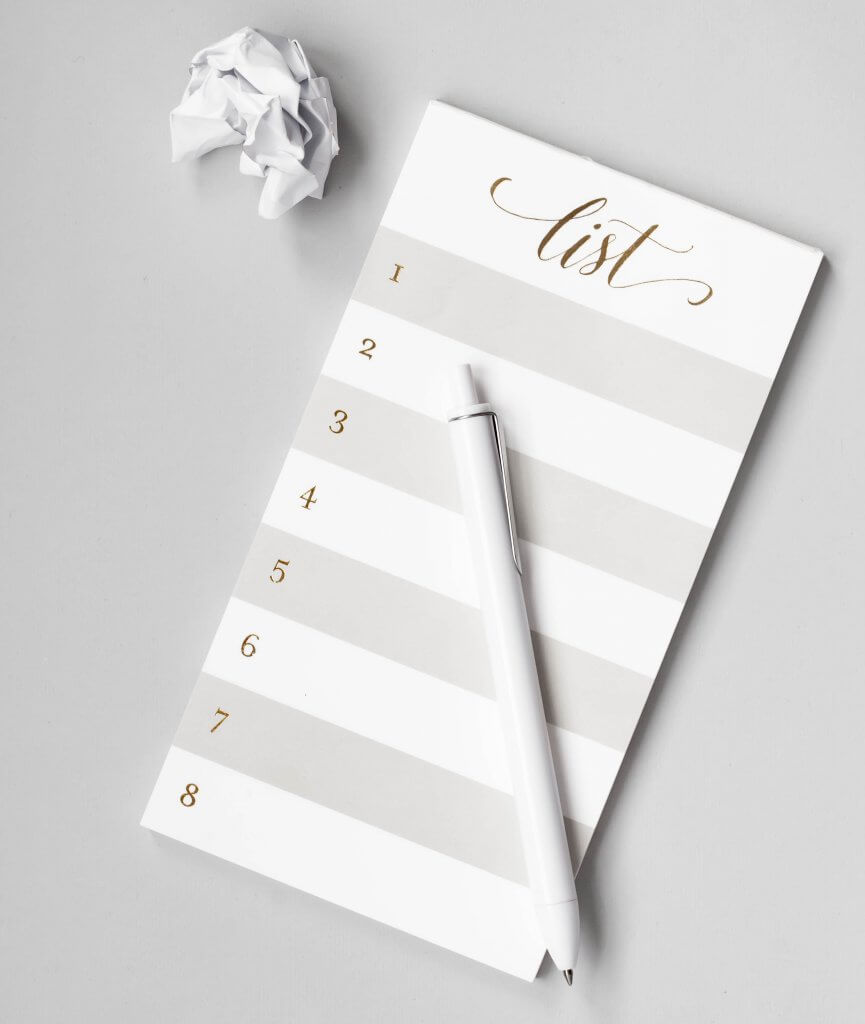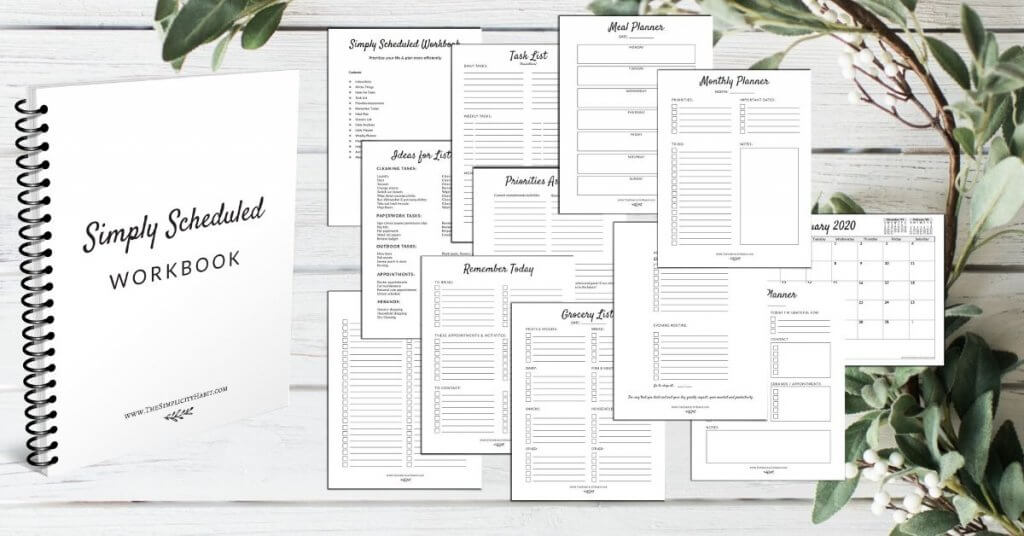Do you feel mentally drained at the end of the day? Over time, just like physical clutter adds up, so does mental clutter. While it isn’t a type of clutter that is as obvious, it is just as important to get rid of mental clutter and clear your mind.
Mental clutter weighs you down. It can make you feel overloaded and overwhelmed. Researchers estimate you have about 60,000 thoughts each day The constant thoughts can cause mental clutter and increase stress.
Don’t continue to carry the burden of mental clutter. You can control your thoughts. As much as patterns may be ingrained, you still have the ability to make different choices and change your habits.

How to Get Rid of Mental Clutter
Instead of allowing the clutter in your mind to continue to pile up, try these tips for reducing mental clutter and clearing your mind.
1. Make lists
A big reason people feel mentally cluttered is because of all the information they carry in their heads. When you are constantly trying to mentally keep track of your to-do lists, grocery lists, events, appointments, and so on, it clutters your mind.
The weight of trying to remember all of those things creates mental clutter. It becomes difficult to focus when you are making your brain work overtime to think about both there here and now as well as keep track of future things.
Give your brain a break by putting all those lists down on paper. I call it an all the things list. Other people call it a brain dump. Whatever you call it the idea is that you are taking all those thoughts you are trying to keep track of in your mind and get them down on paper.
The simple act of writing these things down allows your mind to rest as it is no longer has to keep track of those things.

2. Prioritize
Another thing that causes mental clutter is trying to decide what to do when. Your brain is constantly trying to figure out what to do. Often, you may end up defaulting to something that isn’t your best use of time.
Take the time to set your daily priorities. Write down your 3 most important tasks for that day. Try to get them done when you have the most energy during the day.
This practice helps you to be more productive and make sure you are getting the important things done and helps your mind to not have to continually try to prioritize what’s most important throughout the day.
3. Stop multitasking
The idea that we get more done while multitasking is a lie. Studies have shown that multitasking reduces your efficiency and performance since your brain can only focus on one thing at a time.
Multitasking causes temporary cognitive impairment. If you want to clear your mental clutter and get more done, you need to focus on one thing at a time.
Clear the mental clutter by shutting off distractions to the best of your ability and focus on one singular task at a time.
4. Plan ahead
Stress from a busy schedule can cause additional mental clutter. When you are constantly trying to think of what you need to bring where when, you are both more likely to end up forgetting something as well as adding mental clutter.
When you plan ahead and write down what you’re doing the following day and what you need to bring and who you need to contact, you’ll be better prepared and can free your mind from having to continually think about it.

5. Declutter your schedule
Your mind doesn’t get to rest as often when you have a very full schedule. Reevaluate your schedule and commitments.
Get clear on what your goals are for your life and say no to the things that don’t fit with them. The more clarity you have on what you shouldn’t be doing, the more freedom you have for what matters most to you.
If you are a people pleaser, it’s even more important that you set boundaries. Write them down and stick to it.
6. Create evening and morning routines
A key part of limiting mental clutter is creating daily routines that become habits that you don’t even have to think about.
When you set up a morning routine it helps you start the day off right with a more clear mind.
Having an evening routine allows you to wind down and put your mind and body at rest. This routine helps clear the mental clutter from the day.
7. Consider the influence of technology
The constant pings, dings, and rings of your phone create a feeling that you’re always needing to respond to someone or do something. Significantly reduce or even turn off your notifications to limit your distractions.
Aside from the disturbances of the noises from your phone, next look at the content that you’re filling your mind with. Notice how spending time on social media or reading the news makes you feel.
Excessive time spent on social media and reading news articles significantly increases mental clutter. The first step in reducing this clutter is becoming aware of it.
The next step is to create self-imposed boundaries with technology. Decide when you will use it and how much time you will spend on it. You could even try to see how it feels to completely stop using the most problematic apps for a period of time.

8. Unsubscribe
Another way to help you let go of mental clutter is by deleting some digital clutter. It is hard for our minds to feel clear when our inboxes are full.
Unsubscribe from senders you no longer want to receive email from for whatever reason. Maybe you don’t remember signing up. Perhaps that information is no longer useful to you or the emails tempt you to spend money when you don’t want to.
Clearing out your inbox can feel like such a relief. Another area to clean up is social media. Consider unfollowing people on Instagram or Facebook if they are contributing to your mental clutter.
Follow people or pages that are inspiring, uplifting, and helpful. The same can be true for friends. Protect your mental health and decrease clutter by being selective in what you read and who you follow.

9. Let go of emotional clutter
Mental clutter is closely related to emotional clutter. When you hang onto negative thoughts and feelings for extended periods of time they not only clutter up your emotions, but also your mind.
The process of letting go of emotional clutter is not easy. Some of those feelings can run deep and working with a therapist can be really helpful.
As you work to get healthy emotionally, you’ll find that it frees up mental space as well. Emotions can fog your thoughts and take up a lot of your energy.
10. Do more things that are good for your mental health
To reduce mental clutter, spend more time doing things that are good for your mind, body, and soul. Practice holistic self-care. Make a list of the activities that are life-giving to you. Incorporate more of them into your life.
When you intentionally slow down and do things that fuel your body, mind, and spirit you reduce your mental clutter and improve your overall well being.
We normally live in such a fast-paced culture. It’s easy to get distracted and forget to take care of ourselves. That can land you with mental, emotional, and physical clutter.
When you decrease the mental clutter in your life and add more ways to reduce stress and clear your mind, you’ll feel much better.

A resource to help with mental clutter
Life can feel overwhelming at times, but with resources and a plan, you can reduce your mental clutter. When you simply and effectively plan, your time is spent more intentionally and life runs more smoothly.
“If you fail to plan, you are planning to fail.” -Benjamin Franklin
To help you take back control over your home and your life, I created the Simply Scheduled Workbook. Let go of the stress and burden you carry in your mind by creating a plan.
That doesn’t mean everything will necessarily go as planned, so give yourself grace and change your definition of productivity when it doesn’t all get done. Being flexible and allowing for rest and play are key parts to living a purposeful life.
The Simply Scheduled Workbook contains:
- all the things list
- task lists + ideas
- meal plan & grocery list
- remember today & important dates
- priorities assessment
- morning & evening routines
- daily, weekly, & monthly planners
- monthly calendars
Use the Simply Scheduled Workbook to get a handle on all your to-do’s by creating routines, habits, and systems that work for you.
For more details and to order, go here: https://thesimplicityhabit.vipmembervault.com/products/courses/view/1042352
Want to keep up to date with The Simplicity Habit? Sign up on the form below and get weekly tips on how to declutter and simplify your life. You’ll also get the 8 Quick Wins for decluttering that will give some easy decluttering tasks to help you get started.



Hi Julianna, I really liked your point about getting rid of emotional clutter. I think often our physical clutter is a result of our emotional clutter. Great insight! Thanks for sharing!
I’m so glad you found it helpful, Bonnie!
Hey Juliana, I really liked your view on de-cluttering your mind. I often think that we should organize our thoughts this way. Thank you for participating. I have benefited a lot. I am from Iraq. I follow your posts. It’s great.
Just feel good after reading. Agree with most of it. Thanks for sharing
I was very encouraged by all your information
thank you